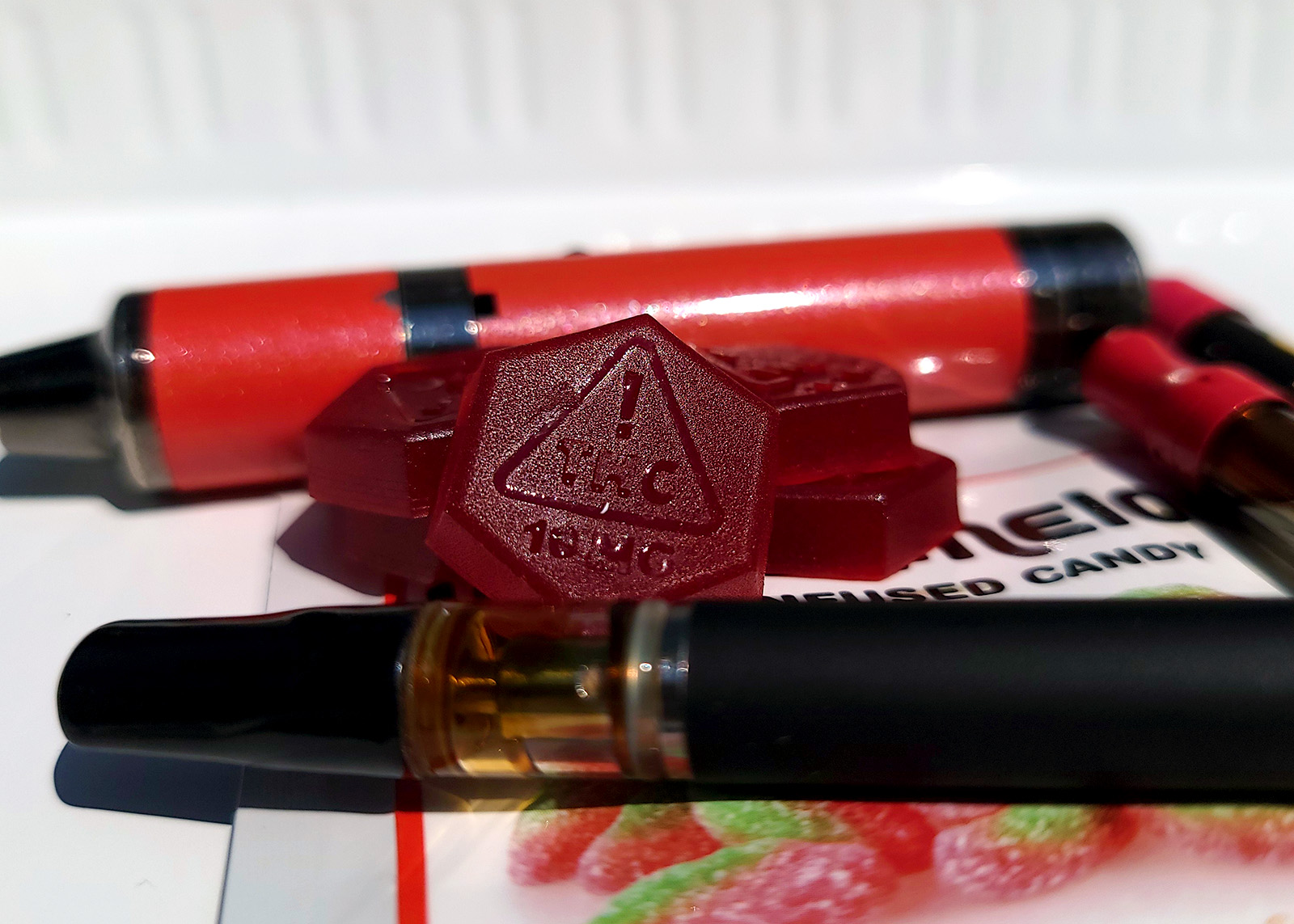IN-DEPTH
Cannabis companies in the Springfield area are holding onto hundreds of thousands of dollars' worth of products after the state regulator issued a recall last week of 62,800 product lines containing distillate or other source material made by Delta Extraction in Robertsville.
The Department of Cannabis Regulation (DCR) has presented no timeline on the recall and producers are dealing with the massive financial burden of replacing products as they try to heal relationships with customers damaged by the recall. The regulator claimed Delta was not properly tracking its products through METRC, the statewide track-and-trace system, meaning some product may have come from out of state or included some out-of-state components, breaking compliance with Missouri law.
Elkland-based Bison Infused, which sells to the majority of dispensaries in Missouri, has about $200,000 worth of product in “quarantine,” or locked in their vault according to the recall’s guidelines, Matt Campbell, chief executive officer, said by phone Monday. If the regulator ultimately says those products have to be destroyed, Bison will find itself financially responsible for not only those products, but also all those in quarantine at all their customers’ dispensaries.
Campbell, whose facility is also the sole licensed provider of Zen Cannabis products in Missouri, said he doesn’t know what the grand total will be from the recall, but could be more than double the value of what sits in their vault currently if all product has to be destroyed.
The state regulator has “an opinion that there is a bad player in the market,” Campbell said. “They’re going to do whatever it takes to bring that bad player down. Unfortunately, the entire market as a whole is going to feel the pain from that.”
$1.25 million in unusable distillate

The recall has hit nearly every Missouri producer that sells to Springfield-area dispensaries in some way. Kansas City-based CLOVR Cannabis, the largest manufacturer in Missouri that has products in many Springfield dispensaries, has $1.25 million worth of distillate on hold under the recall, Josh Mitchem, chief executive officer, said by phone Monday.
CLOVR and other infused-product manufacturers purchase raw distillate from producers like Delta. The raw product is then used to make all kinds of concoctions such as gummies, vape pens, chocolate bars, tinctures and many more.
“I do have several dozen liters of distillate sitting in my facility that I can’t use that I’ve already paid for,” Mitchem said.
In this case, CLOVR purchased the distillate from Humansville-based Flora Farms, another producer that not only sells to many dispensaries in Springfield, but also owns a dispensary in the city as well as ones in its hometown, Ozark and Neosho. Flora did not respond to a request for comment Wednesday.
Across the entire state, the recall has affected more than $30 million worth of products, Greenway Magazine reported last week. As of March 2023, there are 230 retail stores, 87 processors and 67 growers, according to Greenway analysis.
Both Bison and CLOVR said they had only a few product lines involved in the recall, and they weren't affected as much as other producers in the region. Stash House Distribution brands and Agri-Genesis products are included in the recalled product lines from the Department of Health and Senior Services. Stash House and Agri-Genesis did not respond to requests for comment for this story.
Valuable vault space consumed by recall

Even though the recall won't leave Springfield dispensaries financially responsible, it's still impacting their everyday business. Farmer's Wife, a Springfield dispensary with two other locations in the state, is storing all recalled product on “large rolling racks” in their vault, Cody Shackleton, manager, said in an email Wednesday.
“This takes up valuable real estate in our vaults, making it difficult to find space,” Shackleton said.
Bison is already noticing smaller orders from customer dispensaries. “There have been multiple partners that wanted to get more product in, but their order values had to be smaller due to their vault space,” Campbell said.
Safe for human consumption
The Division of Cannabis Regulation “may issue a public notice of recall where marijuana product presents a potential threat to health and safety,” according to the recall notice. The threat to health and safety does not include any “adverse reactions from the products,” but instead refer to the lack of compliance tracking inside METRC.
“The recalled products were not compliantly tracked in the statewide track-and-trace system, METRC, to allow the DCR to verify that the products came from marijuana grown in Missouri or that the product passed required testing prior to being sold at dispensaries,” the recall notice said.
The language of what constitutes a public safety concern can be confusing, as the recalled product already had stringent testing to make sure it was safe for consumption, CLOVR's Mitchem said.
Bison echoed CLOVR's confusion. “That is one area where I feel like the department of health has not done it correctly,” Campbell said. “It’s waving the flag on safety concerns, but we’ve also have gotten the product tested at a very detailed level.”
The Department of Cannabis Regulation “is sympathetic to the impact that this may have on dispensaries, but ensuring health and safety is a top priority, and dispensaries are entrusted with that responsibility as well,” Lisa Cox, spokesperson, said in an email.
“It is important that product be held until the Department determines the product is safe, may be remediated, or must be destroyed.”
Kitty litter-covered gummies

The next steps in the recall are unclear. The state may release all the products, which would only result in a “couple weeks of lost sales,” CLOVR CEO Mitchem said. That's the best-case scenario for producers.
However, due to the confusing language of the recall, Mitchem is worried that even if the products are released, consumers might be confused on the nature of their safety.
“The reality is there was nothing wrong with the testing that was done,” Mitchem said. “But because the state is framing this as a public safety concern, the only way to reinstall confidence is to set up another panel” and “have everything retested.”
If the regulator determines the product will have to be destroyed, there is a protocol in place. Products on hold will have to be combined with some agent to make them unconsumable.
For instance, the bags of Zen gummies held in Bison's vault would have an agent like cat litter dumped all over them, Campbell said. A third party would then be responsible for picking up the destroyed products and distributing them to a disposal site.
Track-and-trace system review
Because the raw distillate that CLOVR purchased indirectly from Delta was tracked through METRC, Mitchem said he is unsure on how producers can prevent another instance like this from occurring. Producers “did their due diligence,” Mitchem said.
“As operators, we have our checks and balances,” he said. “But we also expect that...if it’s inside a state-run platform that’s overseen by the state and audited by the state, we would expect it to be legal product.”
Mitchem said a review of the state's track and trace system may be in order.
“Clearly there are holes inside the state's seed-to-sale tracking that allows for operators to manipulate that software,” he said. “Maybe part of the answer is going back to the software company and saying, ‘How do we close these loopholes?'”
To ensure customers this won't happen again, Bison and Zen are focusing on having “stronger” relations with distillate suppliers, including “having on-site visits for who we're doing business with,” Campbell said.
Jacob Stone, regional manager of Bloom Medicinals, which has one Springfield dispensary and three others in the state, said it is hard to condemn the regulator's actions because the market is so new. Stone previously worked in Colorado, where he said similar recalls had occurred.
“This is just something that happens when a new cannabis market comes online,” Stone said by phone Monday. “They're still learning as they go.”
Stone added that clearer communication from DCR would be appreciated if another recall happens. Bison agreed, saying it is “in the dark” when it comes to communication with the regulator.
“Giving us some sort of timeline of expectations would be helpful,” Campbell said.
The regulator “has spoken directly with several licensees,” Cox said by email Wednesday. “However, as this is related to an ongoing investigation, there a limited amount of information that can be communicated at this time.”
If another recall happens, the regulator needs to lessen the impact on producers who were under no fault, CLOVR CEO Mitchem said.
“I do think that in the future when these things happen there are ways to punish the bad actors without disciplining or hurting the ones that were just trying to make a living,” Mitchem said.


